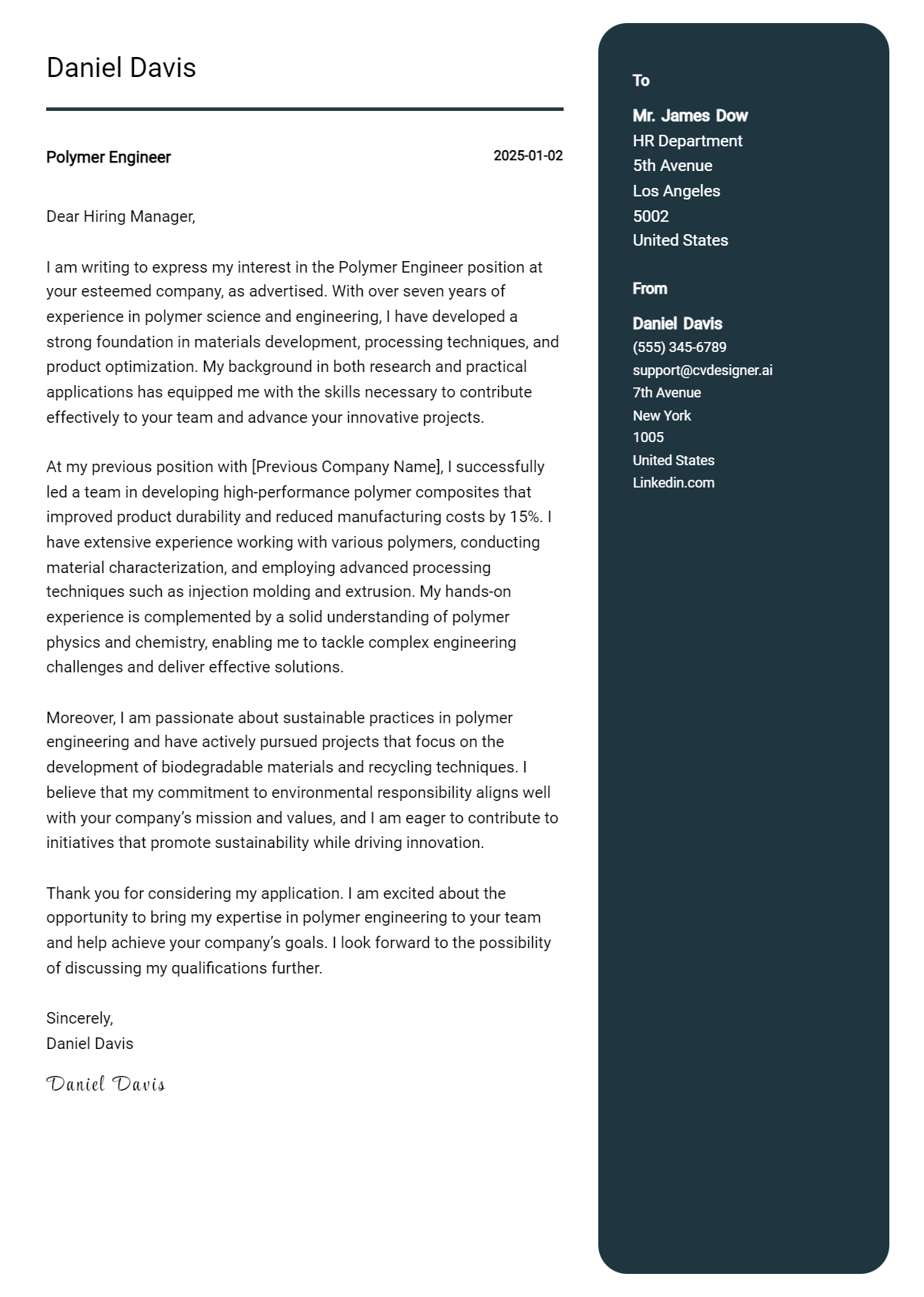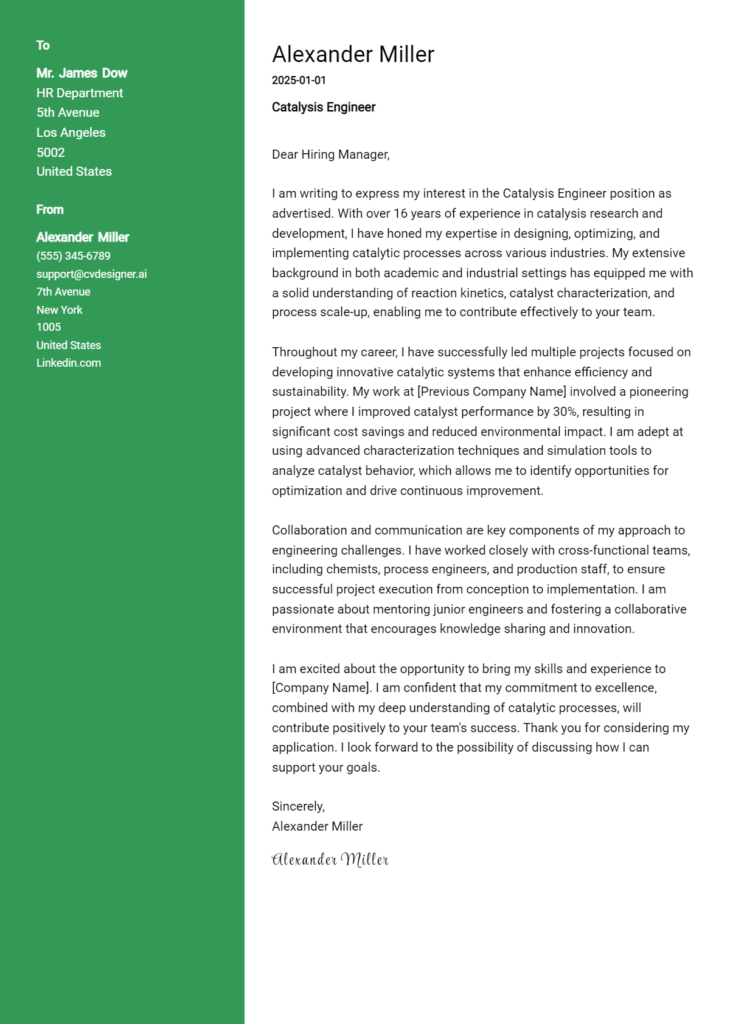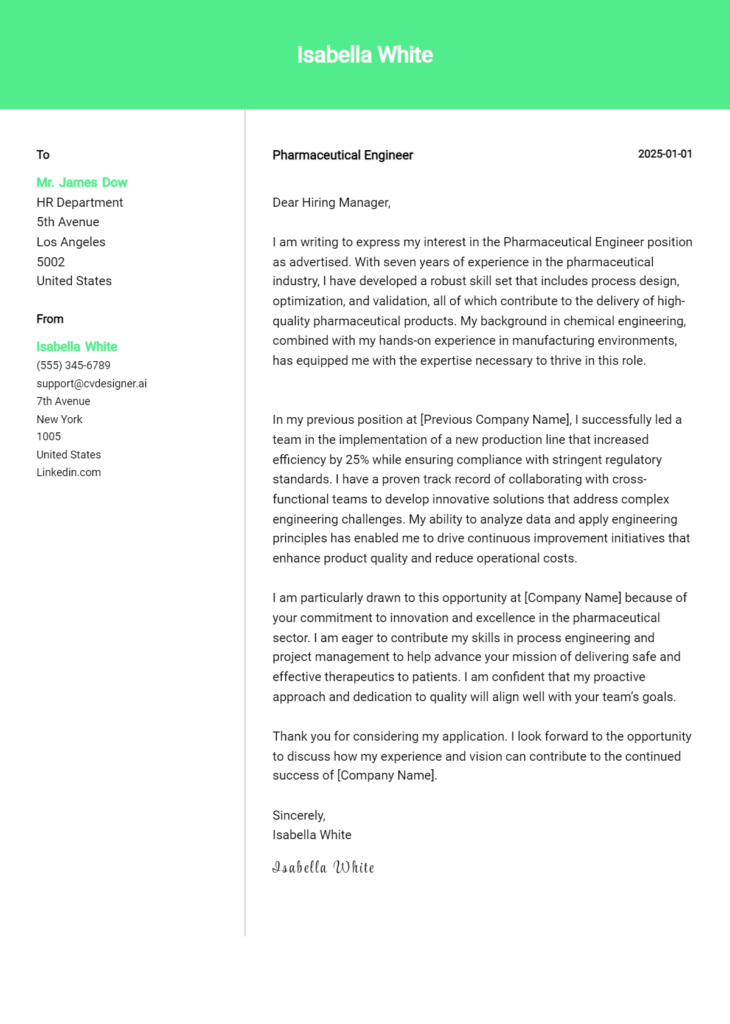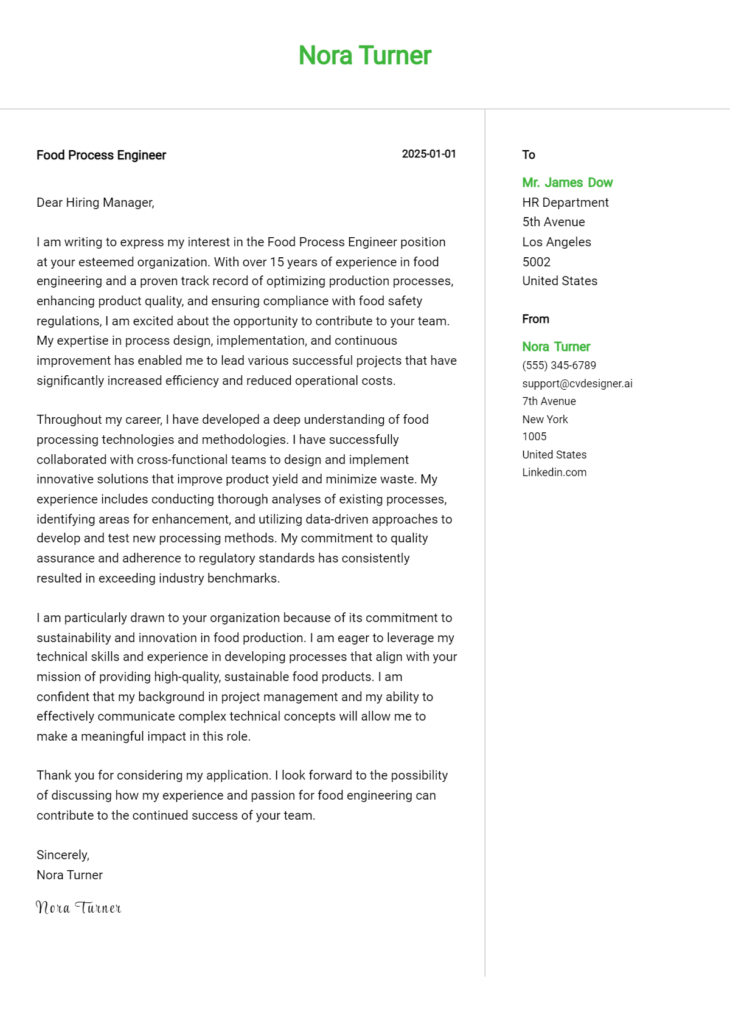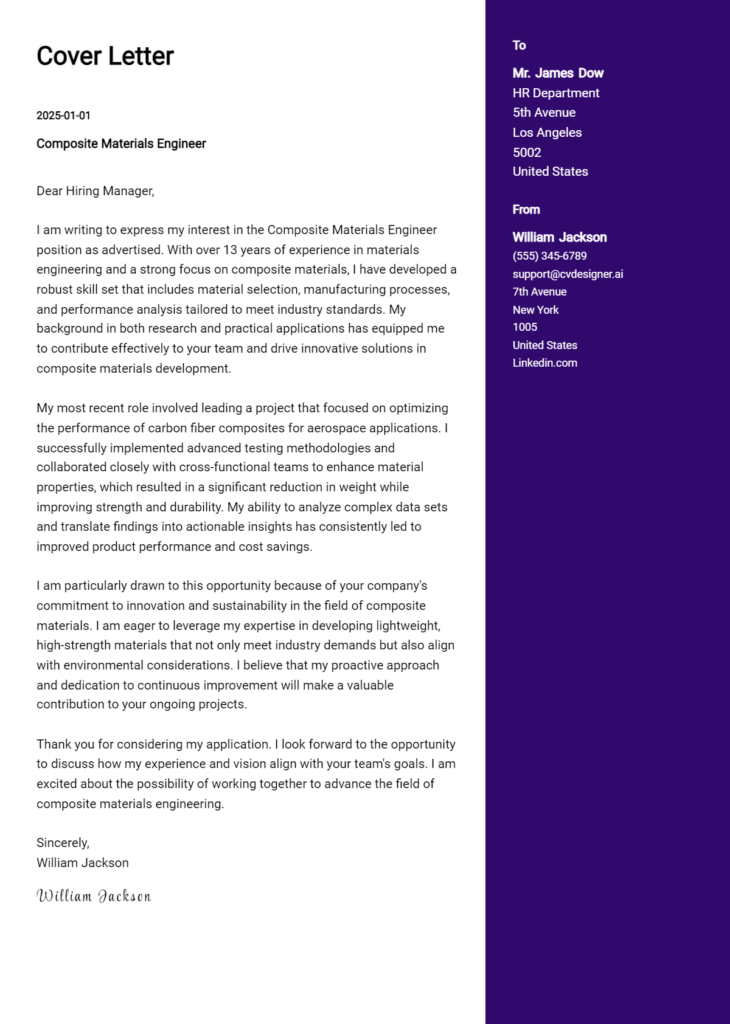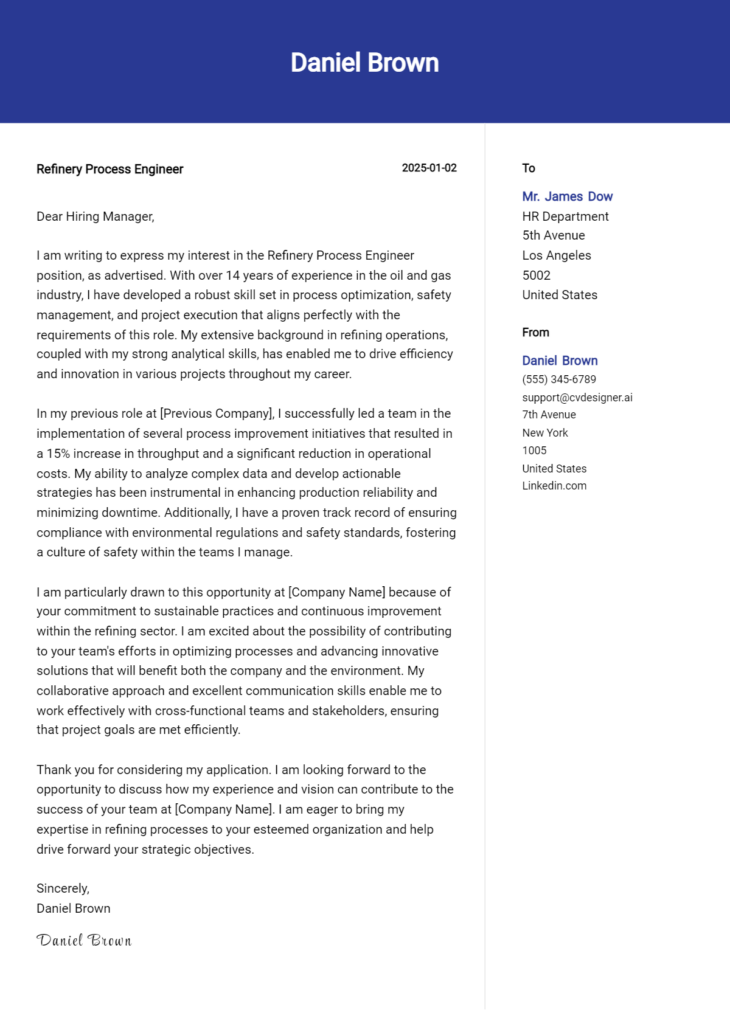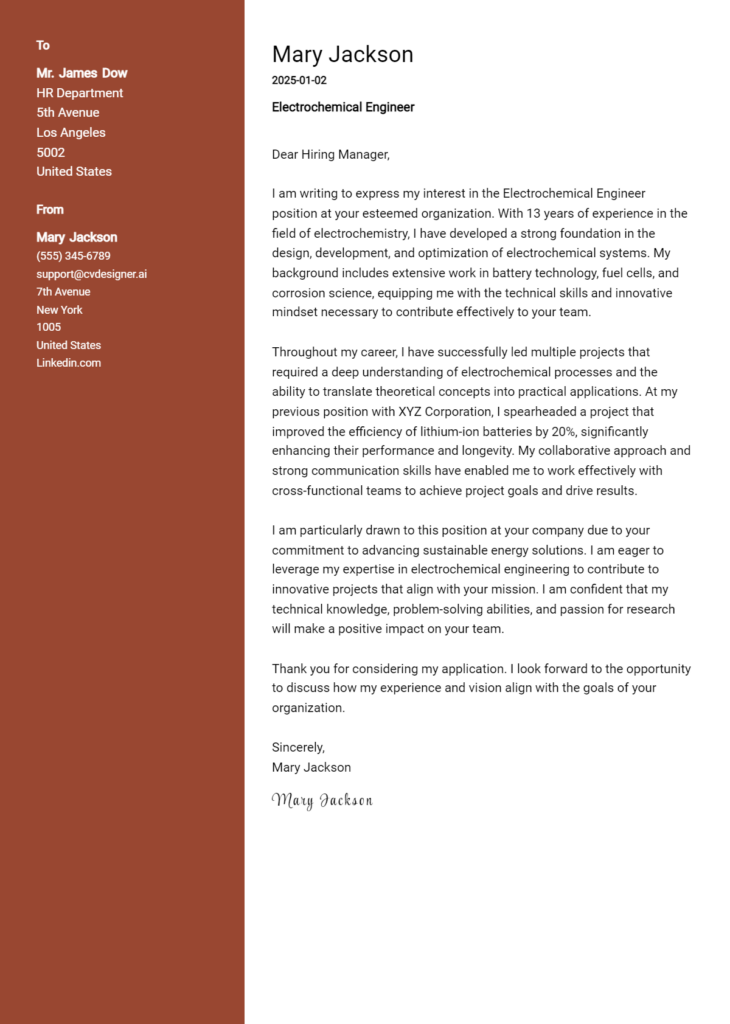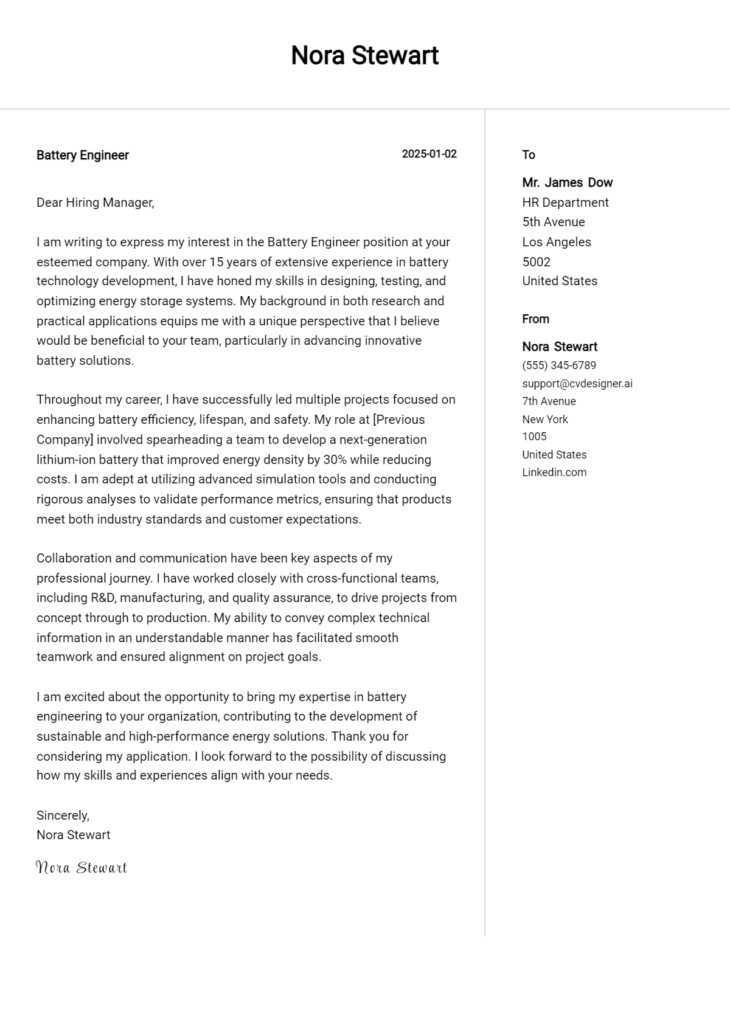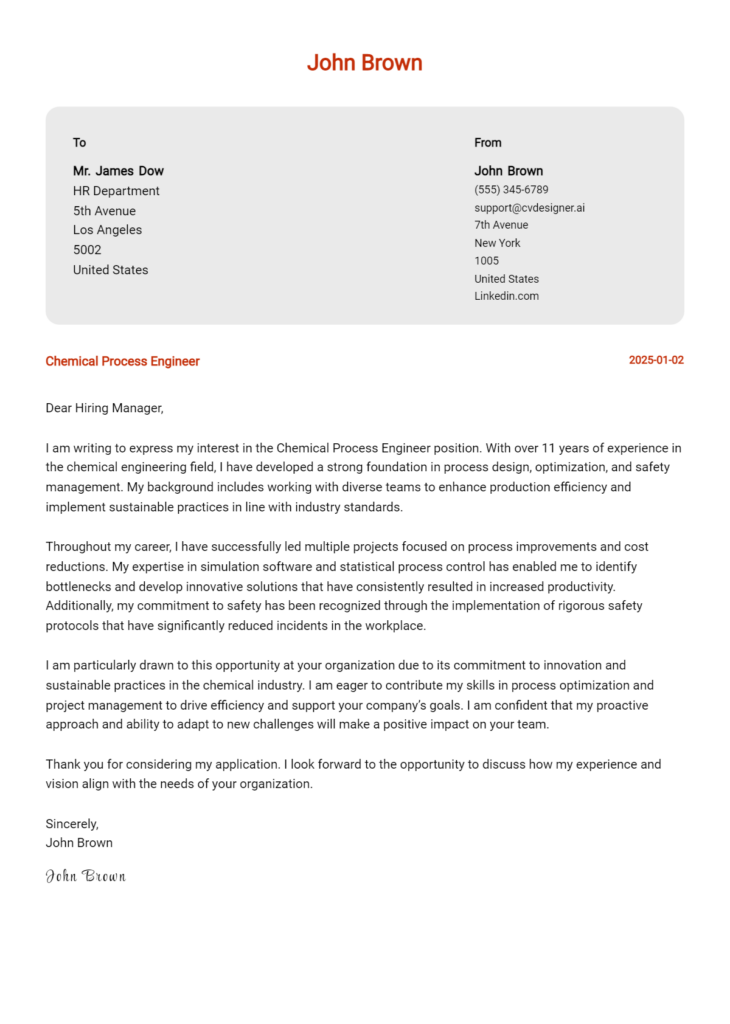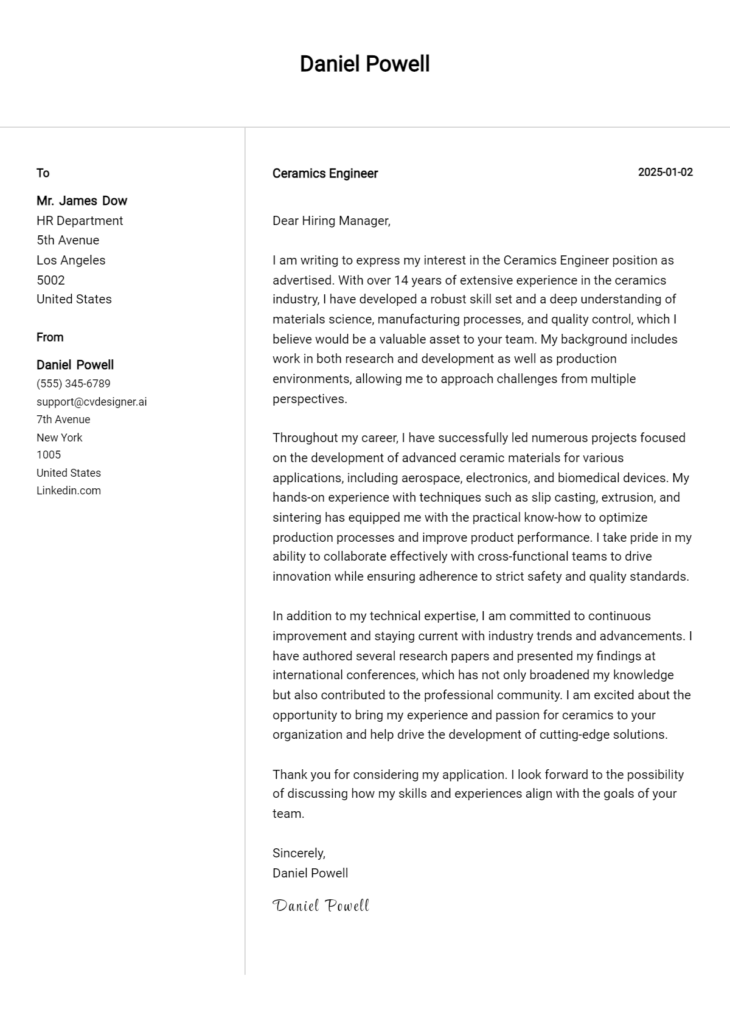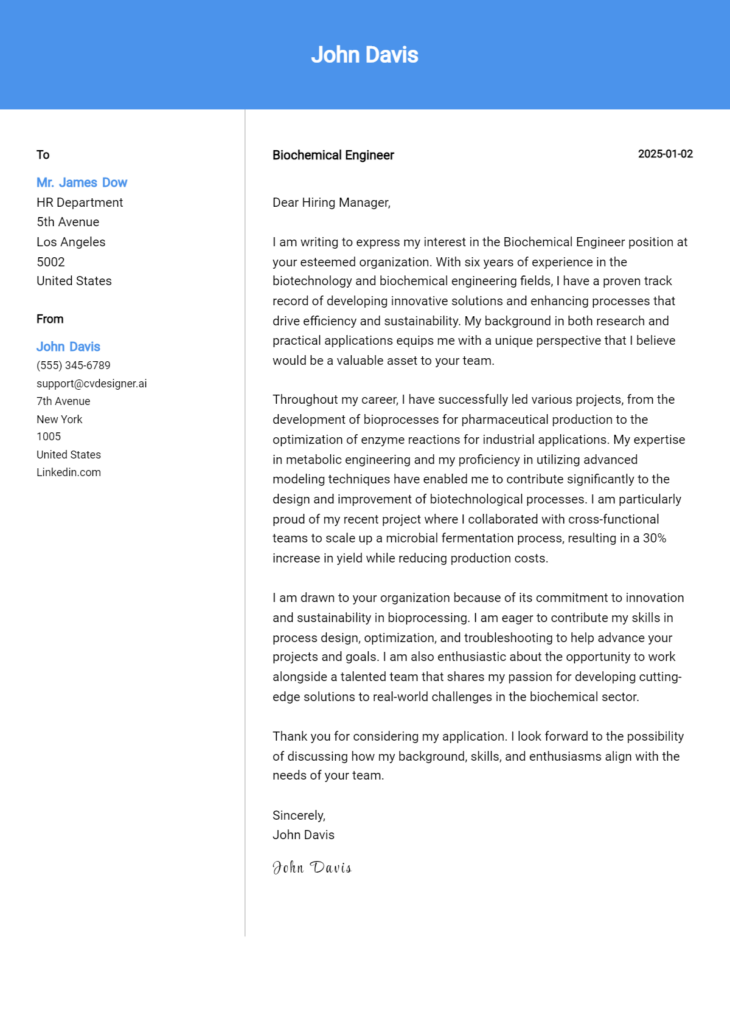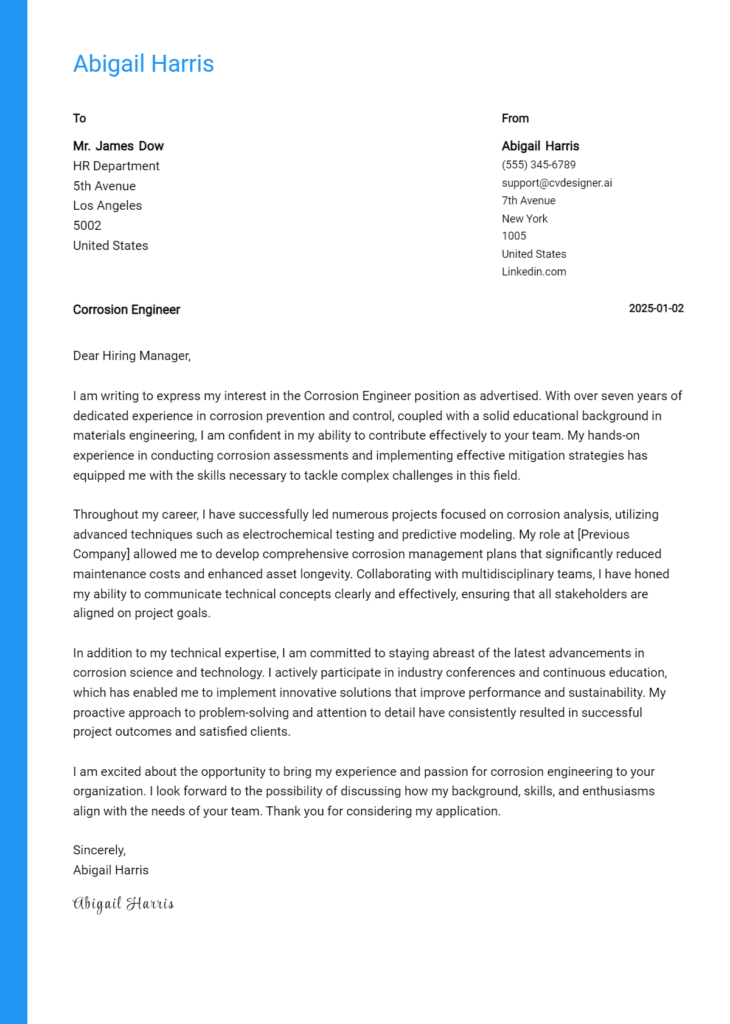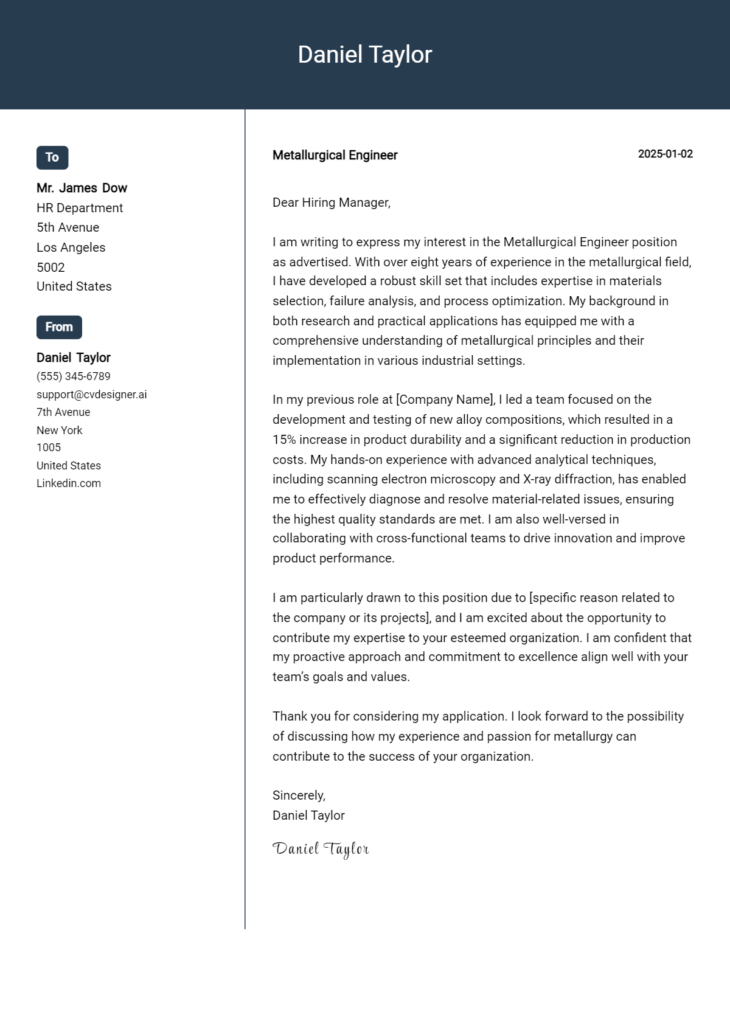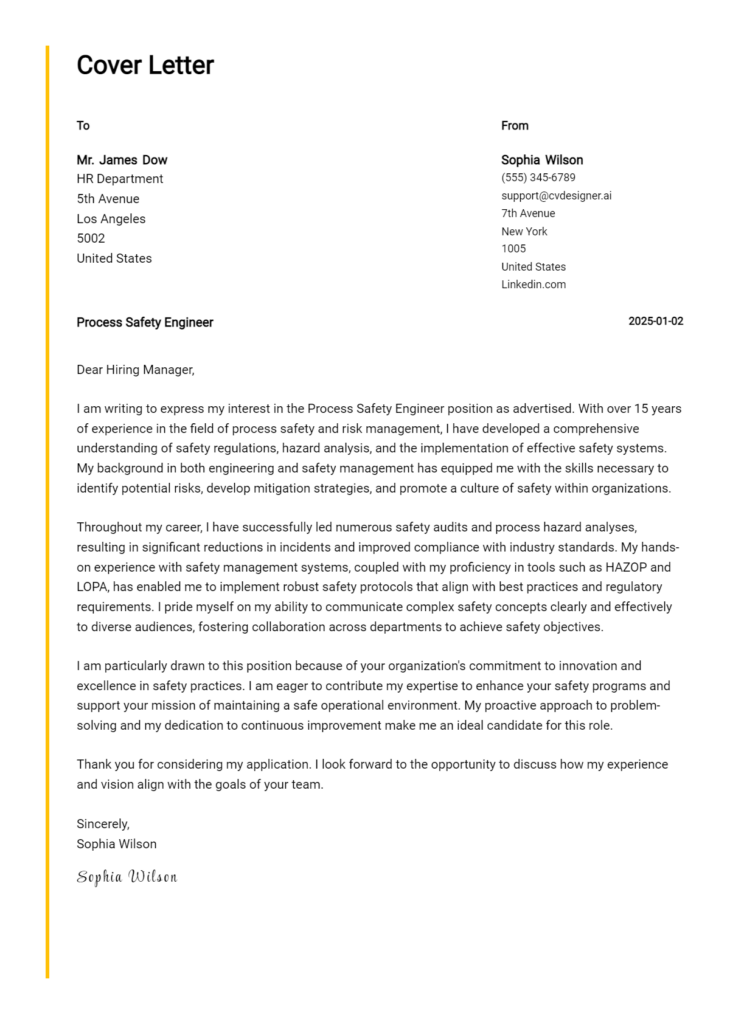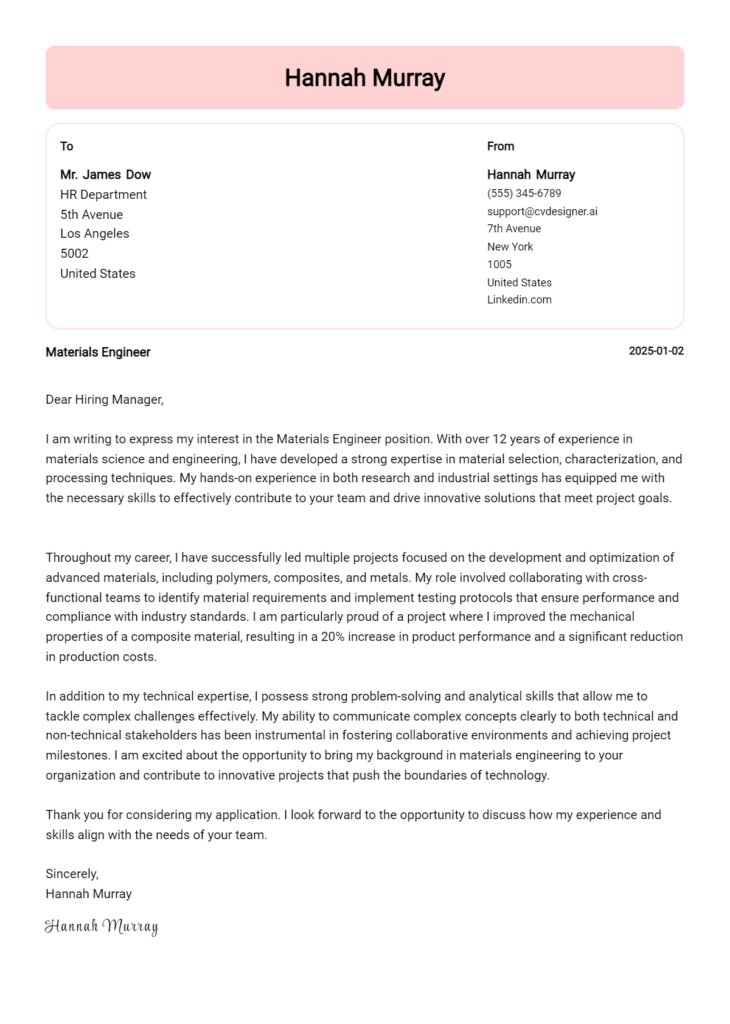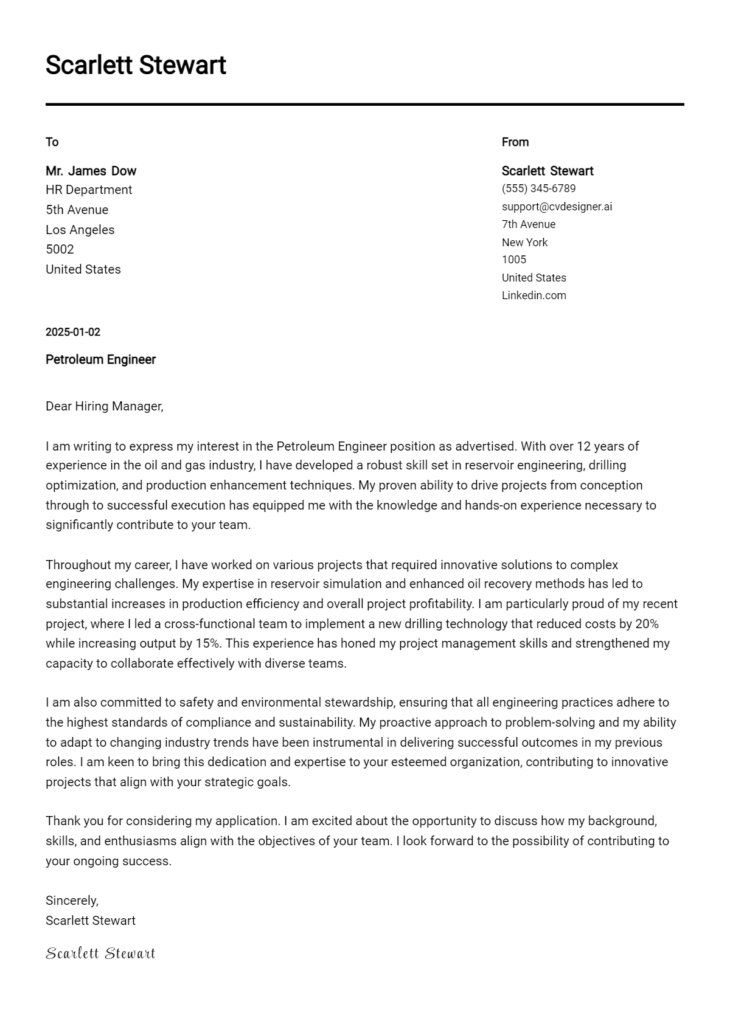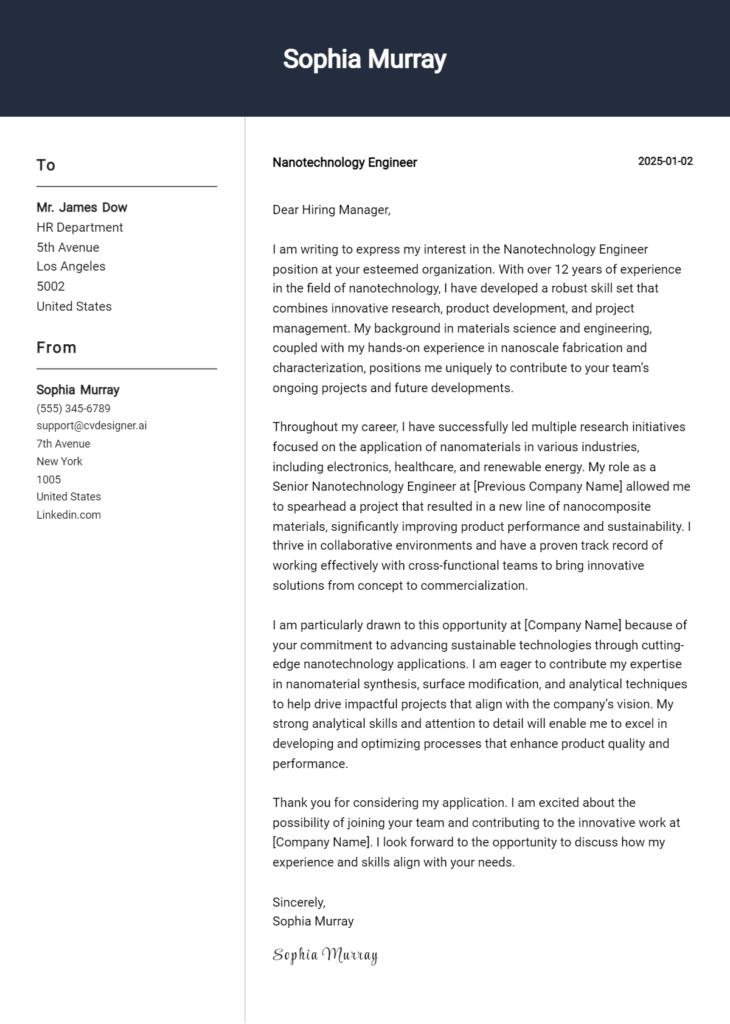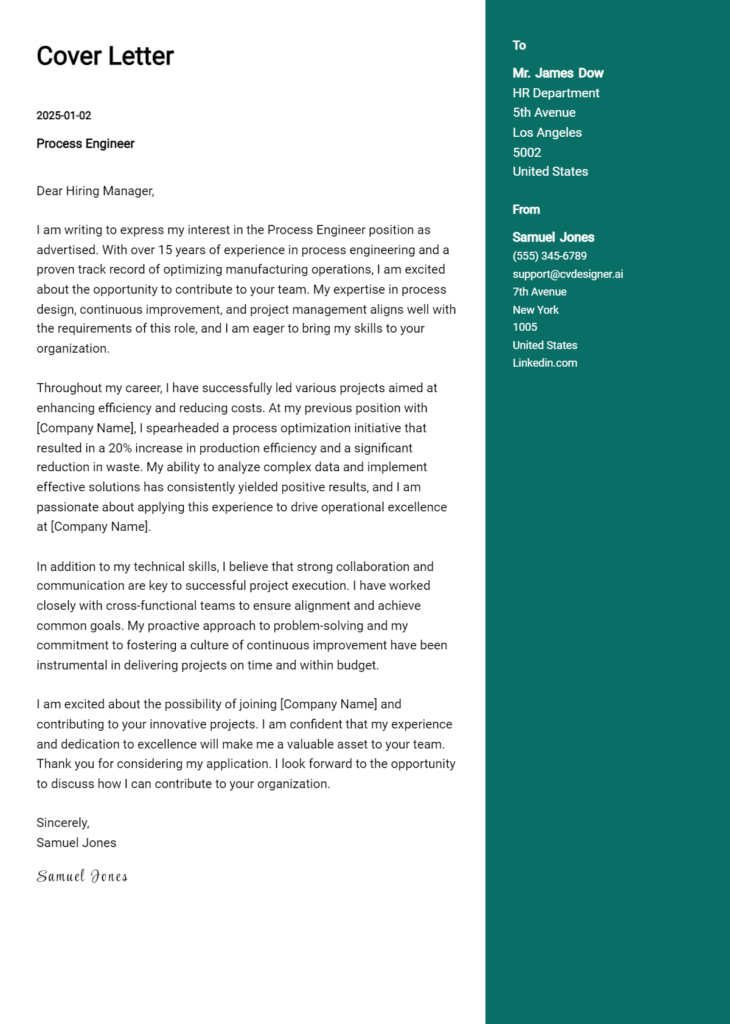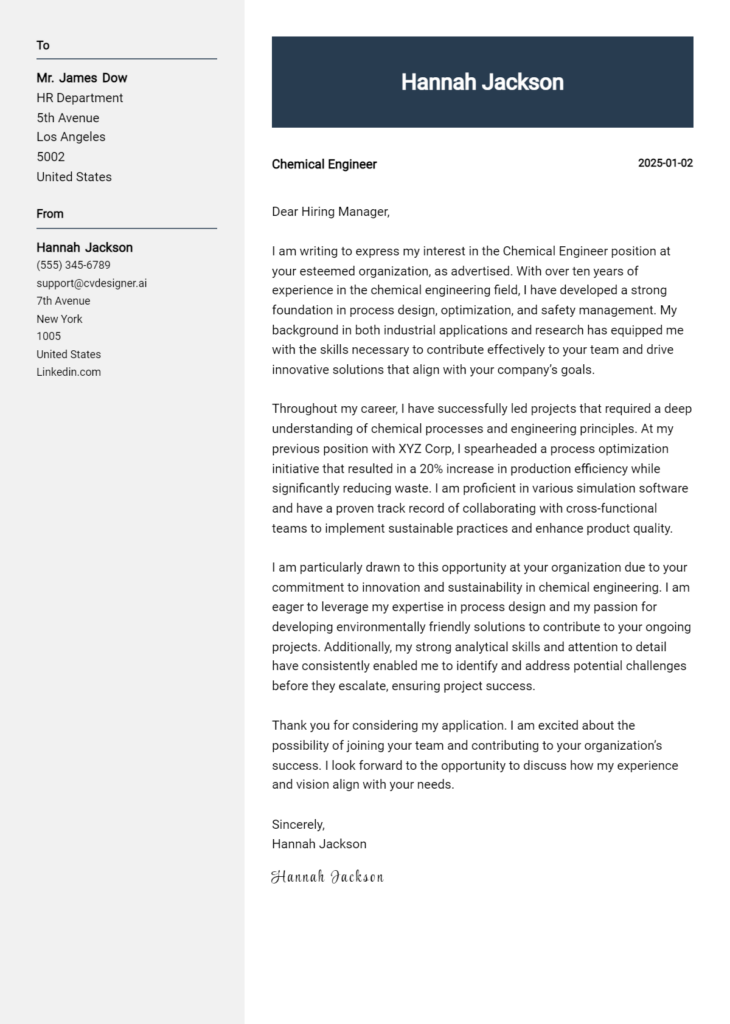Polymer Engineer Cover Letter Examples
Explore additional Polymer Engineer cover letter samples and guides and see what works for your level of experience or role.
How to Format a Polymer Engineer Cover Letter?
Crafting a well-structured cover letter is essential for a Polymer Engineer, as it showcases not only your technical expertise but also your commitment to clarity and organization—qualities that are critical in materials science and engineering. The format of your cover letter serves as a first impression, reflecting your ability to communicate effectively and your attention to detail, both of which are vital in the field of polymer engineering.
In this guide, we'll outline how to structure your cover letter, providing insights and industry-specific examples to help you produce a persuasive document.
We'll focus on the essential components of a professional cover letter, including:
- Cover Letter Header
- Cover Letter Greeting
- Cover Letter Introduction
- Cover Letter Body
- Cover Letter Closing
Each section is crucial for emphasizing your qualifications and professionalism. Let’s break down each part and explain how to make your Polymer Engineer cover letter stand out.
Importance of the Cover Letter Header for a Polymer Engineer
A well-structured cover letter header is crucial for a Polymer Engineer as it sets the tone for your application and reflects your professionalism. The header should include your contact information, the date, and the recipient's details. This information not only makes it easy for the employer to reach you but also demonstrates your attention to detail and organizational skills—qualities essential for a successful engineer. Clarity and professionalism in the header are paramount, as they create a strong first impression.
Here are examples of a strong and weak cover letter header for a Polymer Engineer:
Strong Example
John Doe 123 Polymer Lane Material City, CA 90210 (555) 123-4567 john.doe@email.com October 5, 2023 Jane Smith Hiring Manager Innovative Polymers Inc. 456 Engineering Ave Tech Town, CA 90211
Weak Example
JD Somewhere 12345 (555) 555-5555 email@domain.com 10/05/23 To Whom It May Concern
The Importance of a Cover Letter Greeting for a Polymer Engineer
The greeting of a cover letter serves as the first impression for the hiring manager and sets the tone for the entire letter. A well-crafted greeting demonstrates professionalism and shows that you have taken the time to personalize your application, making it more likely to resonate with the reader. Addressing the hiring manager directly can establish a connection and convey your genuine interest in the position. To make your greeting effective, avoid generic salutations like "To Whom It May Concern." Instead, take the initiative to research the recipient's name and title if necessary, which reflects your commitment and thoroughness.
Here are some examples of strong and weak greetings for a Polymer Engineer cover letter:
Strong Greeting Example
Dear Dr. Smith,
Weak Greeting Example
To Whom It May Concern,
The Importance of a Captivating Cover Letter Introduction for a Polymer Engineer
A well-crafted cover letter introduction is crucial for a Polymer Engineer as it serves as the first impression to a hiring manager. It should effectively grab their attention, express genuine interest in the role, and succinctly highlight key skills or achievements relevant to the position. A strong introduction sets the tone for the rest of the letter and can significantly enhance the candidate's chances of being invited for an interview. Below are examples of both strong and weak cover letter introductions to illustrate how crucial this part of your application can be.
Strong Example
Dear [Hiring Manager's Name], I am excited to apply for the Polymer Engineer position at [Company Name], where I can leverage my extensive experience in polymer synthesis and characterization to contribute to your innovative projects. With a Master's degree in Polymer Science and over five years of hands-on experience in developing high-performance materials for the automotive industry, I have a proven track record of advancing product quality and efficiency. I am particularly drawn to [Company Name]’s commitment to sustainability and cutting-edge research, and I am eager to bring my expertise in biodegradable polymers to your esteemed team.
Weak Example
To Whom It May Concern, I am writing to apply for the job of Polymer Engineer. I have some experience in this field and think I could do well at [Company Name]. I have worked with polymers before, but I'm not sure how my skills match what you're looking for.
Purpose of the Cover Letter Body for a Polymer Engineer
The cover letter body serves as a critical component in presenting a Polymer Engineer's qualifications and unique contributions to a potential employer. This section should effectively highlight the candidate's technical skills, relevant experiences, and specific accomplishments that align with the company's goals. By detailing projects, such as the development of a new polymer blend that improved product durability by 30%, or participation in a cross-functional team that successfully reduced production costs, candidates can demonstrate their value and problem-solving capabilities. A well-crafted cover letter body not only showcases expertise in polymer science but also illustrates how these skills can benefit the organization.
Strong Example
As a Polymer Engineer with over five years of experience in the development and testing of advanced polymer materials, I am excited about the opportunity to contribute to your team at XYZ Corporation. In my previous role at ABC Technologies, I led a project that developed a new biodegradable polymer, which resulted in a 40% reduction in waste during production and garnered positive feedback from our sustainability stakeholders. My expertise in polymer characterization and formulation optimization would be an asset in advancing your innovative projects, particularly in developing sustainable materials that meet market demands.
Weak Example
I am applying for the Polymer Engineer position at your company. I have worked with polymers for a while and know some things about them. I think my background could be useful. I once worked on a project that involved polymers, but I can't remember the details. I hope to bring my skills to your company and help with your projects.
Importance of the Cover Letter Closing for a Polymer Engineer
The closing paragraph of a cover letter is crucial in leaving a lasting impression on the hiring manager. It should succinctly summarize your qualifications, reiterate your enthusiasm for the Polymer Engineer role, and encourage the reader to take the next steps, such as reviewing your resume or scheduling an interview. A strong closing can reinforce your suitability for the position and demonstrate your proactive approach, while a weak closing may leave the reader uncertain about your interest or qualifications.
Strong Example
Thank you for considering my application for the Polymer Engineer position at [Company Name]. With my extensive background in polymer synthesis and processing, coupled with my passion for innovative material solutions, I am excited about the opportunity to contribute to your team. I look forward to discussing how my expertise aligns with the goals of [Company Name] and exploring the potential of working together. Please feel free to review my resume, and I hope to schedule an interview soon to further discuss my qualifications.
Weak Example
I hope you look at my resume. I think I would be good for the Polymer Engineer job. Let me know if you want to talk.
These tips will help candidates craft an effective cover letter for a Polymer Engineer position. A well-written cover letter is crucial for making a strong first impression, and it provides an opportunity to showcase not only your technical skills but also your problem-solving abilities and teamwork experience. Highlighting your knowledge of the Software Development Life Cycle (SDLC) and expressing a passion for continuous learning will further strengthen your application.
Tips for Writing an Effective Cover Letter for a Polymer Engineer
Showcase Your Technical Skills
Clearly outline your technical skills related to polymer engineering, such as material selection, synthesis techniques, and characterization methods. Use specific examples from your previous work experience or academic projects to demonstrate how you applied these skills effectively. This will show potential employers that you possess the expertise necessary for the role.Highlight Problem-Solving Abilities
Polymer engineering often involves troubleshooting and finding innovative solutions to complex issues. Include a specific instance where you successfully identified a problem, analyzed potential solutions, and implemented a successful outcome. This not only showcases your analytical skills but also your ability to think critically under pressure.Demonstrate SDLC Knowledge
If your role involves software tools related to polymer engineering, mention your familiarity with the Software Development Life Cycle (SDLC) and any relevant methodologies. Discuss how you have integrated these practices into your projects, emphasizing your understanding of the stages from planning to deployment. This will illustrate your ability to work effectively within interdisciplinary teams.Emphasize Teamwork and Collaboration
Engineering projects often require collaboration with various stakeholders. Share experiences where you worked in a team environment, detailing your role and contributions. Highlight how you communicated effectively with different team members and how this collaboration led to project success. This will show your potential employer that you are a team player who values cooperation in achieving common goals.Express Your Passion for Continuous Learning
The field of polymer engineering is constantly evolving, and a commitment to continuous learning is essential. Mention any recent courses, certifications, or workshops you have completed that are relevant to the position. Discuss how you stay updated on industry trends and advancements, demonstrating your proactive approach to professional development. This enthusiasm for learning will resonate with employers looking for candidates who are eager to grow and adapt.
For additional inspiration, consider utilizing cover letter templates or a cover letter builder to streamline your writing process and create a polished, professional document.
Common Mistakes to Avoid in a Polymer Engineer Cover Letter
Crafting an effective cover letter is a vital step in securing a position as a Polymer Engineer. Common mistakes can undermine your application and reduce your chances of making a strong impression. Here are some frequent pitfalls to avoid:
Generic Content: Failing to tailor your cover letter to the specific job can make it blend in with countless other applications. Do your research on the company and highlight relevant experiences.
Lack of Technical Details: As a Polymer Engineer, it's essential to include specific technical skills and projects. Be sure to mention relevant software, techniques, or methodologies that showcase your expertise.
Ignoring the Cover Letter Format: A disorganized cover letter can distract from your content. Follow a clear structure, ensuring your introduction, body, and conclusion are well-defined. For guidance, check out this cover letter format.
Repetition of Your Resume: Your cover letter should complement your resume, not repeat it. Use it as an opportunity to elaborate on your experiences and demonstrate your passion for the field.
Poor Proofreading: Typos and grammatical errors can create a negative impression. Always proofread your letter or ask someone else to review it before submission to ensure clarity and professionalism.
Neglecting a Strong Closing Statement: A weak closing can leave a lasting negative impression. Conclude with a strong statement that reiterates your enthusiasm for the role and invites further discussion.
Forgetting to Include Relevant Examples: Highlight specific projects or achievements that relate to the job. Use metrics or outcomes to illustrate your impact, making your application memorable.
By steering clear of these mistakes and focusing on clear, targeted communication, you'll increase your chances of standing out as a strong candidate for the Polymer Engineer position. For additional inspiration, consider exploring these cover letter examples.
Cover Letter FAQs for Polymer Engineer
What should I include in my cover letter as a Polymer Engineer?
In your cover letter, focus on your technical skills and relevant experiences that align with the job description. Highlight your expertise in polymer synthesis, characterization, and processing techniques. Mention specific projects where you've successfully developed or improved polymer materials. Don't forget to include your educational background, especially if you have advanced degrees or certifications in polymer science or engineering. Additionally, convey your ability to work collaboratively in multidisciplinary teams and your passion for innovation in polymer applications. Tailor your letter to the company’s goals and values, showcasing how your background can contribute to their success.
How can I demonstrate my technical skills in a cover letter?
To effectively demonstrate your technical skills in a cover letter, use specific examples from your past work or academic projects. Detail the tools, techniques, and methodologies you are proficient in, such as rheology, spectroscopy, or thermal analysis. You could mention any software or modeling tools you’ve used, like CAD or simulation software relevant to polymer applications. Discuss the outcomes of your projects—did you improve material properties, reduce costs, or enhance performance? Quantifying your achievements can make a stronger impact. Remember to connect these skills to the requirements of the position you’re applying for, showing how they provide value.
How should I address gaps in my experience in my cover letter?
If you have gaps in your experience, be honest yet strategic in your cover letter. Focus on transferable skills or relevant coursework that may bridge the gap. If you engaged in volunteer work, internships, or research during the gap, highlight those experiences and what you learned from them. You can also mention any additional training or certifications you've pursued to enhance your skills during that time. Emphasize your eagerness to learn and adapt, and how your unique experiences can bring a fresh perspective to the role. Keep the tone positive and forward-looking, focusing on how you’re ready to contribute to the team.
Should I customize my cover letter for each job application?
Absolutely! Customizing your cover letter for each job application is crucial, especially in specialized fields like polymer engineering. Tailor your letter to reflect the specific skills and experiences that align with the job description. Research the company to understand its products, projects, and culture, and incorporate that information into your letter. Use keywords from the job listing to demonstrate your attention to detail and genuine interest in the position. A customized cover letter showcases your enthusiasm and suitability for the role, making it more likely to catch the hiring manager's attention compared to a generic one.
Build your Cover Letter in minutes
Use an AI-powered cover letter builder and have your letter done in 5 minutes. Just select your template and our software will guide you through the process.

